313 posts
Thewalrusr3x - The Walrus King - Tumblr Blog
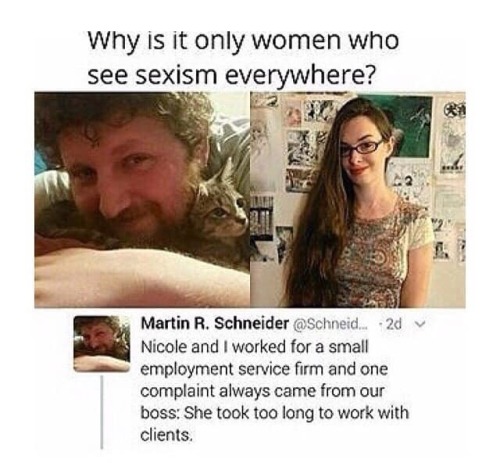
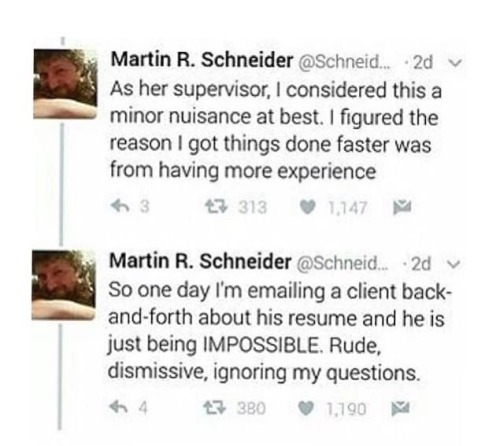



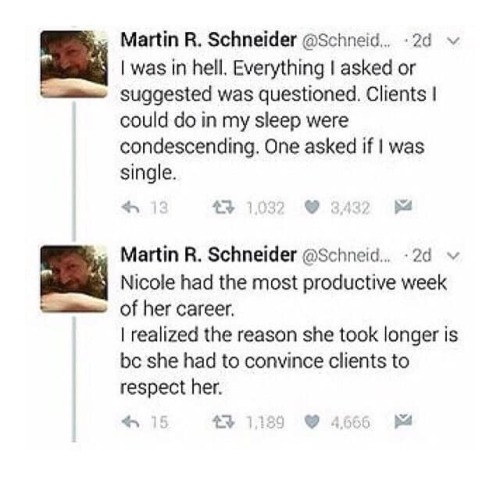

If you bring respect and common courtesy to work, it will produce different effects in different people. In my particular case, the majority have responded in kind. There are outliers. A married woman asked me for sex. A different woman in an abusive relationship apparently left her abuser to return to her mom's. Several others decided that I was creepy and / or flirting because the only people who have ever shown them respect or common courtesy were trying to manipulate them into sexual encounters. I have a great boss who understands that I have no unethical pursuits in the workplace or anywhere else. However, to protect myself, I cannot nor should speak to while I am working. Be careful, some people are never going to respond well to your best intentions or act in your best interests. I hope you all have a better day today than the last best day you remember.
tbh having an outdoor cat should be treated the same as any other kind of animal neglect. nothing says “i don’t want to take care of my animal” like throwing it out into a world full of cars, disease, parasites, predators, poison, malicious human beings and all sorts of freak accidents just so you don’t have to deal with entertaining it.

This is going to hit a nerve with some people. The Second Amendment is only a Right if everyone has it. At least every citizen, which may be difficult to ascertain at first glance. In practice, it is only a right for hyper masculine straight presenting white males. We let these douche cannoos wander around in public loaded for bear and tacticooled all the way to their chest protector. Go ahead, try being a law abiding black gun owner during a traffic stop. Try accidentally dropping your firearm in public as a black man. Other people will make up some story about how bad your law abiding has been in the past. They will lie about you as you bleed out. Because, in reality, we are terrible at extending Rights to the people we have othered. It's not a right if people will kill you in cold blood just for possession. Because they don't see you as a human. We deserve better.
omfg i forgot that i never showed tumblr my greatest achievement. my pride and joy, my pi-ass de résistance
Hey, you are not an embarrassment for not knowing how to do certain household chores/basic self-care. They do not come naturally to us. A lot of it takes practice! Maybe you had a neglectful guardian. Maybe you had one that was very coddling and never thought to teach you. Maybe you haven't lived in a place where these things were available to you or needed. Doesn't matter. It's okay to not know and far more common than you might realise.
That said, this website provides very simple instructions on how to do everyday tasks such as making your bed, using a washing machine, cooking different foods, washing dishes, taking a shower, etc. All you have to do is use the search bar to find the task you're struggling with, and it'll come up with what you need + other related how-to's:)
If you're having trouble navigating it, let me provide you with some examples:
How to clean dishes by hand
How to make your bed (with visual demonstrations of each step!)
How to fold clothes (with visual demonstrations of each step!)
How to take a shower & dry yourself off (also provides ways to shave beards, armpits, legs and genitals)
How to shave legs, armpits, beards, pubic areas, etc. (a more in-depth guide)
How to mop the floor
How to sweep the floor
How to swallow pills
How to make small talk
How to make eye contact in different situations (or how to avoid it while still looking natural)
It's also perfectly okay if these don't help or aren't appealing to you. Unfortunately, nothing helps everyone.
My heart is breaking. I look deeply into this country for something that satisfies the home sickness for a place that does exist. You could be apple pie and a hug from your nan. Instead, you're cops attacking students who dare to sit quietly for peace. Instead, you are another dead kid. Instead, you are lonely. And you have forgotten how to get back to a hug from your nan.
As protests start ramping up and violence escalates please remember:
DO NOT PUT MILK IN YOUR EYES FOR PEPPER SPRAY OR TEAR GAS.
It can and will cause infection due to bacteria. Flush with water, distilled if possible, and never EVER wear contact lenses to protests where there may be police retaliation.
Please reblog. It may save someone's sight.

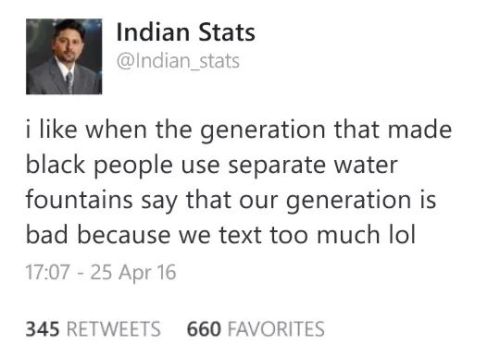
“If a society puts half its children into short skirts and warns them not to move in ways that reveal their panties, while putting the other half into jeans and overalls and encouraging them to climb trees, play ball, and participate in other vigorous outdoor games; if later, during adolescence, the children who have been wearing trousers are urged to “eat like growing boys,” while the children in skirts are warned to watch their weight and not get fat; if the half in jeans runs around in sneakers or boots, while the half in skirts totters about on spike heels, then these two groups of people will be biologically as well as socially different. Their muscles will be different, as will their reflexes, posture, arms, legs and feet, hand-eye coordination, and so on. Similarly, people who spend eight hours a day in an office working at a typewriter or a visual display terminal will be biologically different from those who work on construction jobs. There is no way to sort the biological and social components that produce these differences. We cannot sort nature from nurture when we confront group differences in societies in which people from different races, classes, and sexes do not have equal access to resources and power, and therefore live in different environments. Sex-typed generalizations, such as that men are heavier, taller, or stronger than women, obscure the diversity among women and among men and the extensive overlaps between them… Most women and men fall within the same range of heights, weights, and strengths, three variables that depend a great deal on how we have grown up and live. We all know that first-generation Americans, on average, are taller than their immigrant parents and that men who do physical labor, on average, are stronger than male college professors. But we forget to look for the obvious reasons for differences when confronted with assertions like ‘Men are stronger than women.’ We should be asking: ‘Which men?’ and ‘What do they do?’ There may be biologically based average differences between women and men, but these are interwoven with a host of social differences from which we cannot disentangle them.”
— Ruth Hubbard, “The Political Nature of ‘Human Nature’“ (via gothhabiba)
Yes.
“If a society puts half its children into short skirts and warns them not to move in ways that reveal their panties, while putting the other half into jeans and overalls and encouraging them to climb trees, play ball, and participate in other vigorous outdoor games; if later, during adolescence, the children who have been wearing trousers are urged to “eat like growing boys,” while the children in skirts are warned to watch their weight and not get fat; if the half in jeans runs around in sneakers or boots, while the half in skirts totters about on spike heels, then these two groups of people will be biologically as well as socially different. Their muscles will be different, as will their reflexes, posture, arms, legs and feet, hand-eye coordination, and so on. Similarly, people who spend eight hours a day in an office working at a typewriter or a visual display terminal will be biologically different from those who work on construction jobs. There is no way to sort the biological and social components that produce these differences. We cannot sort nature from nurture when we confront group differences in societies in which people from different races, classes, and sexes do not have equal access to resources and power, and therefore live in different environments. Sex-typed generalizations, such as that men are heavier, taller, or stronger than women, obscure the diversity among women and among men and the extensive overlaps between them… Most women and men fall within the same range of heights, weights, and strengths, three variables that depend a great deal on how we have grown up and live. We all know that first-generation Americans, on average, are taller than their immigrant parents and that men who do physical labor, on average, are stronger than male college professors. But we forget to look for the obvious reasons for differences when confronted with assertions like ‘Men are stronger than women.’ We should be asking: ‘Which men?’ and ‘What do they do?’ There may be biologically based average differences between women and men, but these are interwoven with a host of social differences from which we cannot disentangle them.”
— Ruth Hubbard, “The Political Nature of ‘Human Nature’“ (via gothhabiba)
Yes.

kids remind me, often, of the things i've taught myself out of.
i have a big dog. he looks like a deer. he is taller than most young children. while we were on a trail the other day, a boy coming our direction saw us and froze. he took a step back and said: "i'm feeling nervous. your - your dog is kind of big."
goblin and i both stopped walking immediately. "he is kind of a big dog," i admitted. "he's called a greyhound. they are gentle but they are pretty tall, which is kind of scary, you're right. their legs are so long because they are made for running fast. i am sorry we scared you. would you like us to stand still while you move past us, or would you feel more safe in your body if we move and you stay still?'
"oh. i didn't know that about - greyhounds. i think i ... i want to stay still," he said. at this point, his adult had caught up to us. "i'm nervous about the dog," he told her, "so i'm - i'm gonna stay still." she didn't argue. she didn't make fun of him. she just smiled at him and at me and held his hand while goblin and i, with as wide of a berth as we could make, crept our way through.
behind us, i heard him exhale a deep breath and kind of laugh - "he was really big, huh? she said it's because greyhounds have to go fast."
"he was big," she said. "i understand why that could have made you a little scared."
"yeah. next time i - next time do you think i could maybe ask to touch him? when - i mean, next time, maybe, if i'm not nervous."
later, going to a work event, in the big city, i stood outside, trembling. my social anxiety as a caught bird in my chest. i took a deep breath and turned to my coworker. she's not even really my friend yet. i told her: "i feel nervous about this. i am not used to meeting new people, ever since covid."
she laughed, but not in a mean way. she said she was nervous too. she reached her hand out and held mine, and we both took another deep breath and walked in like that, interlinked. a few people asked us - together? - and i told the truth: i feel nervous, and she's helping. over and over i watched people relax too, admitting i feel really kind of shy lately actually, thank you for saying that.
the next time i go to an event, and i feel a little scared, i ask right away: wanna hold hands? this feels a little dangerous. i hesitate less. i don't hide it as much. i watch for other people who are also nervous and say - it's kinda hard, huh?
i know, logically, i'm not good at asking for help. but i am also not good at noticing when i need help. i've trained myself out of asking completely, but i've also trained myself to never accept my own fears or excuses. i have trained myself to tamp down every anxiety and just-push-through. i don't know what i'm protecting myself from - just that i never think to admit it to anyone.
but every person on earth occasionally needs comfort. every person on earth occasionally needs connection. many of us were taught independence is the same thing as never needing anything.
each of us should have had an adult who heard - i feel nervous and held our hand and asked us how we could be helped to feel safe. no judgement, and no chiding. many of us did not. many of us were punished for the ways that we seemed "weak".
but here is something: i am an adult now. and i get nervous a lot, actually. and if you are an adult and you are feeling a little nervous - come talk to me. we can hold hands and figure out what will help us feel safe in our bodies. and maybe, next time, if we're brave, we can pet the dog that's passing.
I feel like I should make a post about this because it’s not something that’s very well-known, and that Americans in particular may need to know about given the uncertain state of our healthcare system at the moment. I’ve wanted to write this out for a while, It’s kind of a long post, so sorry about that!
If you have an emergency and have to go to the hospital, you’ll owe the hospital a lot of money. (I got into a car wreck and broke my ankle and my arm. My hospital bill was around $20,000)
You’ll also owe the ambulance provider, if you need one. (My ambulance bill was about $800)
You may get separate bills from the anesthesiologist or surgeon. (My anesthesiologist bill was $1,700)
You may need follow-up appointments. (My orthopedic surgeon billed me for the appointments and his surgery together and it was about $1,000)
You’ve also got to pay for medical equipment you need afterward, like crutches or a walking boot. (Mine cost about $75)
Altogether, I ended up with almost $24,000 in medical debt from one car accident. That’s a really scary number for someone like me who makes $10/hr at a 12 hour a week job.
I got my debt down to $1075 by making some phone calls and submitting some paperwork.
The first thing I did was contact the hospital. They don’t make it easy to find, but many hospitals (perhaps most hospitals?) have financial assistance programs for people who can’t afford medical bills. I don’t make a lot of money, and I have bills to pay, so they were able to help me. I called the billing department and asked if they had any assistance programs for low income people who can’t pay their bills. I had to call multiple times, and I got transferred in circles by people who didn’t know what I was talking about. Finally, I got an appointment with someone in “Eligibility Services” (I don’t know what other hospitals call it, if it’s something different). I had to bring my pay stubs and copies of all of my bills. When I got to the hospital for the appointment, nobody knew what I was talking about so I had to wander a little to find where I needed to go. I spoke with the guy in Eligibility Services, and I waited for a decision on how much of the bill they would forgive. A month later, I got a call telling me it was totally forgiven.
I did the same thing for my ambulance bill and my anesthesiologist, but the process was a LOT easier. I just had to mail some paperwork and it was totally forgiven.
I didn’t bother with the medical equipment suppliers, since the bills came from separate companies and I didn’t feel like going through the process twice for $75. I was assured at the hospital that they had similar programs for debt forgiveness, so I could have probably avoided paying that too.
The only thing I couldn’t get taken care of was the surgeon/follow-up appointment cost, but they were able to put me on a no-interest payment plan.
Medical debt is scary because it’s something that can come from stuff that’s already really scary. I didn’t need the burden of $24,000 in debt on top of trying to get around on a crutch with a broken arm (it’s not easy, believe me!).. but I can’t imagine what it would be like with a bigger debt or a more severe medical emergency. I see lots of people in even worse trouble than I was in, both financially and medically. Please know that there are options for you when that GoFundMe doesn’t do enough. Even if your income is higher than mine, it’s worth a shot even for partial debt forgiveness.
How to shatter the class solidarity of the ruling class

I'm touring my new, nationally bestselling novel The Bezzle! Catch me WEDNESDAY (Apr 11) at UCLA, then Chicago (Apr 17), Torino (Apr 21) Marin County (Apr 27), Winnipeg (May 2), Calgary (May 3), Vancouver (May 4), and beyond!

Audre Lorde counsels us that "The Master's Tools Will Never Dismantle the Master's House," while MLK said "the law cannot make a man love me, but it can restrain him from lynching me." Somewhere between replacing the system and using the system lies a pragmatic – if easily derailed – course.
Lorde is telling us that a rotten system can't be redeemed by using its own chosen reform mechanisms. King's telling us that unless we live, we can't fight – so anything within the system that makes it easier for your comrades to fight on can hasten the end of the system.
Take the problems of journalism. One old model of journalism funding involved wealthy newspaper families profiting handsomely by selling local appliance store owners the right to reach the townspeople who wanted to read sports-scores. These families expressed their patrician love of their town by peeling off some of those profits to pay reporters to sit through municipal council meetings or even travel overseas and get shot at.
In retrospect, this wasn't ever going to be a stable arrangement. It relied on both the inconstant generosity of newspaper barons and the absence of a superior way to show washing-machine ads to people who might want to buy washing machines. Neither of these were good long-term bets. Not only were newspaper barons easily distracted from their sense of patrician duty (especially when their own power was called into question), but there were lots of better ways to connect buyers and sellers lurking in potentia.
All of this was grossly exacerbated by tech monopolies. Tech barons aren't smarter or more evil than newspaper barons, but they have better tools, and so now they take 51 cents out of every ad dollar and 30 cents out of ever subscriber dollar and they refuse to deliver the news to users who explicitly requested it, unless the news company pays them a bribe to "boost" their posts:
https://www.eff.org/deeplinks/2023/04/saving-news-big-tech
The news is important, and people sign up to make, digest, and discuss the news for many non-economic reasons, which means that the news continues to struggle along, despite all the economic impediments and the vulture capitalists and tech monopolists who fight one another for which one will get to take the biggest bite out of the press. We've got outstanding nonprofit news outlets like Propublica, journalist-owned outlets like 404 Media, and crowdfunded reporters like Molly White (and winner-take-all outlets like the New York Times).
But as Hamilton Nolan points out, "that pot of money…is only large enough to produce a small fraction of the journalism that was being produced in past generations":
https://www.hamiltonnolan.com/p/what-will-replace-advertising-revenue
For Nolan, "public funding of journalism is the only way to fix this…If we accept that journalism is not just a business or a form of entertainment but a public good, then funding it with public money makes perfect sense":
https://www.hamiltonnolan.com/p/public-funding-of-journalism-is-the
Having grown up in Canada – under the CBC – and then lived for a quarter of my life in the UK – under the BBC – I am very enthusiastic about Nolan's solution. There are obvious problems with publicly funded journalism, like the politicization of news coverage:
https://www.theguardian.com/media/2023/jan/24/panel-approving-richard-sharp-as-bbc-chair-included-tory-party-donor
And the transformation of the funding into a cheap political football:
https://www.cbc.ca/news/politics/poilievre-defund-cbc-change-law-1.6810434
But the worst version of those problems is still better than the best version of the private-equity-funded model of news production.
But Nolan notes the emergence of a new form of hedge fund news, one that is awfully promising, and also terribly fraught: Hunterbrook Media, an investigative news outlet owned by short-sellers who pay journalists to research and publish damning reports on companies they hold a short position on:
https://hntrbrk.com/
For those of you who are blissfully distant from the machinations of the financial markets, "short selling" is a wager that a company's stock price will go down. A gambler who takes a short position on a company's stock can make a lot of money if the company stumbles or fails altogether (but if the company does well, the short can suffer literally unlimited losses).
Shorts have historically paid analysts to dig into companies and uncover the sins hidden on their balance-sheets, but as Matt Levine points out, journalists work for a fraction of the price of analysts and are at least as good at uncovering dirt as MBAs are:
https://www.bloomberg.com/opinion/articles/2024-04-02/a-hedge-fund-that-s-also-a-newspaper
What's more, shorts who discover dirt on a company still need to convince journalists to publicize their findings and trigger the sell-off that makes their short position pay off. Shorts who own a muckraking journalistic operation can skip this step: they are the journalists.
There's a way in which this is sheer genius. Well-funded shorts who don't care about the news per se can still be motivated into funding freely available, high-quality investigative journalism about corporate malfeasance (notoriously, one of the least attractive forms of journalism for advertisers). They can pay journalists top dollar – even bid against each other for the most talented journalists – and supply them with all the tools they need to ply their trade. A short won't ever try the kind of bullshit the owners of Vice pulled, paying themselves millions while their journalists lose access to Lexisnexis or the PACER database:
https://pluralistic.net/2024/02/24/anti-posse/#when-you-absolutely-positively-dont-give-a-solitary-single-fuck
The shorts whose journalists are best equipped stand to make the most money. What's not to like?
Well, the issue here is whether the ruling class's sense of solidarity is stronger than its greed. The wealthy have historically oscillated between real solidarity (think of the ultrawealthy lobbying to support bipartisan votes for tax cuts and bailouts) and "war of all against all" (as when wealthy colonizers dragged their countries into WWI after the supply of countries to steal ran out).
After all, the reason companies engage in the scams that shorts reveal is that they are profitable. "Behind every great fortune is a great crime," and that's just great. You don't win the game when you get into heaven, you win it when you get into the Forbes Rich List.
Take monopolies: investors like the upside of backing an upstart company that gobbles up some staid industry's margins – Amazon vs publishing, say, or Uber vs taxis. But while there's a lot of upside in that move, there's also a lot of risk: most companies that set out to "disrupt" an industry sink, taking their investors' capital down with them.
Contrast that with monopolies: backing a company that merges with its rivals and buys every small company that might someday grow large is a sure thing. Shriven of "wasteful competition," a company can lower quality, raise prices, capture its regulators, screw its workers and suppliers and laugh all the way to Davos. A big enough company can ignore the complaints of those workers, customers and regulators. They're not just too big to fail. They're not just too big to jail. They're too big to care:
https://pluralistic.net/2024/04/04/teach-me-how-to-shruggie/#kagi
Would-be monopolists are stuck in a high-stakes Prisoner's Dilemma. If they cooperate, they can screw over everyone else and get unimaginably rich. But if one party defects, they can raid the monopolist's margins, short its stock, and snitch to its regulators.
It's true that there's a clear incentive for hedge-fund managers to fund investigative journalism into other hedge-fund managers' portfolio companies. But it would be even more profitable for both of those hedgies to join forces and collude to screw the rest of us over. So long as they mistrust each other, we might see some benefit from that adversarial relationship. But the point of the 0.1% is that there aren't very many of them. The Aspen Institute can rent a hall that will hold an appreciable fraction of that crowd. They buy their private jets and bespoke suits and powdered rhino horn from the same exclusive sellers. Their kids go to the same elite schools. They know each other, and they have every opportunity to get drunk together at a charity ball or a society wedding and cook up a plan to join forces.
This is the problem at the core of "mechanism design" grounded in "rational self-interest." If you try to create a system where people do the right thing because they're selfish assholes, you normalize being a selfish asshole. Eventually, the selfish assholes form a cozy little League of Selfish Assholes and turn on the rest of us.
Appeals to morality don't work on unethical people, but appeals to immorality crowds out ethics. Take the ancient split between "free software" (software that is designed to maximize the freedom of the people who use it) and "open source software" (identical to free software, but promoted as a better way to make robust code through transparency and peer review).
Over the years, open source – an appeal to your own selfish need for better code – triumphed over free software, and its appeal to the ethics of a world of "software freedom." But it turns out that while the difference between "open" and "free" was once mere semantics, it's fully possible to decouple the two. Today, we have lots of "open source": you can see the code that Google, Microsoft, Apple and Facebook uses, and even contribute your labor to it for free. But you can't actually decide how the software you write works, because it all takes a loop through Google, Microsoft, Apple or Facebook's servers, and only those trillion-dollar tech monopolists have the software freedom to determine how those servers work:
https://pluralistic.net/2020/05/04/which-side-are-you-on/#tivoization-and-beyond
That's ruling class solidarity. The Big Tech firms have hidden a myriad of sins beneath their bafflegab and balance-sheets. These (as yet) undiscovered scams constitute a "bezzle," which JK Galbraith defined as "the magic interval when a confidence trickster knows he has the money he has appropriated but the victim does not yet understand that he has lost it."
The purpose of Hunterbrook is to discover and destroy bezzles, hastening the moment of realization that the wealth we all feel in a world of seemingly orderly technology is really an illusion. Hunterbrook certainly has its pick of bezzles to choose from, because we are living in a Golden Age of the Bezzle.
Which is why I titled my new novel The Bezzle. It's a tale of high-tech finance scams, starring my two-fisted forensic accountant Marty Hench, and in this volume, Hench is called upon to unwind a predatory prison-tech scam that victimizes the most vulnerable people in America – our army of prisoners – and their families:
https://us.macmillan.com/books/9781250865878/thebezzle
The scheme I fictionalize in The Bezzle is very real. Prison-tech monopolists like Securus and Viapath bribe prison officials to abolish calls, in-person visits, mail and parcels, then they supply prisoners with "free" tablets where they pay hugely inflated rates to receive mail, speak to their families, and access ebooks, distance education and other electronic media:
https://pluralistic.net/2024/04/02/captive-customers/#guillotine-watch
But a group of activists have cornered these high-tech predators, run them to ground and driven them to the brink of extinction, and they've done it using "the master's tools" – with appeals to regulators and the finance sector itself.
Writing for The Appeal, Dana Floberg and Morgan Duckett describe the campaign they waged with Worth Rises to bankrupt the prison-tech sector:
https://theappeal.org/securus-bankruptcy-prison-telecom-industry/
Here's the headline figure: Securus is $1.8 billion in debt, and it has eight months to find a financier or it will go bust. What's more, all the creditors it might reasonably approach have rejected its overtures, and its bonds have been downrated to junk status. It's a dead duck.
Even better is how this happened. Securus's debt problems started with its acquisition, a leveraged buyout by Platinum Equity, who borrowed heavily against the firm and then looted it with bogus "management fees" that meant that the debt continued to grow, despite Securus's $700m in annual revenue from America's prisoners. Platinum was just the last in a long line of PE companies that loaded up Securus with debt and merged it with its competitors, who were also mortgaged to make profits for other private equity funds.
For years, Securus and Platinum were able to service their debt and roll it over when it came due. But after Worth Rises got NYC to pass a law making jail calls free, creditors started to back away from Securus. It's one thing for Securus to charge $18 for a local call from a prison when it's splitting the money with the city jail system. But when that $18 needs to be paid by the city, they're going to demand much lower prices. To make things worse for Securus, prison reformers got similar laws passed in San Francisco and in Connecticut.
Securus tried to outrun its problems by gobbling up one of its major rivals, Icsolutions, but Worth Rises and its coalition convinced regulators at the FCC to block the merger. Securus abandoned the deal:
https://worthrises.org/blogpost/securusmerger
Then, Worth Rises targeted Platinum Equity, going after the pension funds and other investors whose capital Platinum used to keep Securus going. The massive negative press campaign led to eight-figure disinvestments:
https://www.latimes.com/business/story/2019-09-05/la-fi-tom-gores-securus-prison-phone-mass-incarceration
Now, Securus's debt became "distressed," trading at $0.47 on the dollar. A brief, covid-fueled reprieve gave Securus a temporary lifeline, as prisoners' families were barred from in-person visits and had to pay Securus's rates to talk to their incarcerated loved ones. But after lockdown, Securus's troubles picked up right where they left off.
They targeted Platinum's founder, Tom Gores, who papered over his bloody fortune by styling himself as a philanthropist and sports-team owner. After a campaign by Worth Rises and Color of Change, Gores was kicked off the Los Angeles County Museum of Art board. When Gores tried to flip Securus to a SPAC – the same scam Trump pulled with Truth Social – the negative publicity about Securus's unsound morals and financials killed the deal:
https://twitter.com/WorthRises/status/1578034977828384769
Meanwhile, more states and cities are making prisoners' communications free, further worsening Securus's finances:
https://pluralistic.net/2024/02/14/minnesota-nice/#shitty-technology-adoption-curve
Congress passed the Martha Wright-Reed Just and Reasonable Communications Act, giving the FCC the power to regulate the price of federal prisoners' communications. Securus's debt prices tumbled further:
https://www.govtrack.us/congress/bills/117/s1541
Securus's debts were coming due: it owes $1.3b in 2024, and hundreds of millions more in 2025. Platinum has promised a $400m cash infusion, but that didn't sway S&P Global, a bond-rating agency that re-rated Securus's bonds as "CCC" (compare with "AAA"). Moody's concurred. Now, Securus is stuck selling junk-bonds:
https://www.govtrack.us/congress/bills/117/s1541
The company's creditors have given Securus an eight-month runway to find a new lender before they force it into bankruptcy. The company's debt is trading at $0.08 on the dollar.
Securus's major competitor is Viapath (prison tech is a duopoly). Viapath is also debt-burdened and desperate, thanks to a parallel campaign by Worth Rises, and has tried all of Securus's tricks, and failed:
https://pestakeholder.org/news/american-securities-fails-to-sell-prison-telecom-company-viapath/
Viapath's debts are due next year, and if Securus tanks, no one in their right mind will give Viapath a dime. They're the walking dead.
Worth Rise's brilliant guerrilla warfare against prison-tech and its private equity backers are a master class in using the master's tools to dismantle the master's house. The finance sector isn't a friend of justice or working people, but sometimes it can be used tactically against financialization itself. To paraphrase MLK, "finance can't make a corporation love you, but it can stop a corporation from destroying you."
Yes, the ruling class finds solidarity at the most unexpected moments, and yes, it's easy for appeals to greed to institutionalize greediness. But whether it's funding unbezzling journalism through short selling, or freeing prisons by brandishing their cooked balance-sheets in the faces of bond-rating agencies, there's a lot of good we can do on the way to dismantling the system.

If you'd like an essay-formatted version of this post to read or share, here's a link to it on pluralistic.net, my surveillance-free, ad-free, tracker-free blog:
https://pluralistic.net/2024/04/08/money-talks/#bullshit-walks

Image: KMJ (modified) https://commons.wikimedia.org/wiki/File:Boerse_01_KMJ.jpg
CC BY-SA 3.0 https://creativecommons.org/licenses/by-sa/3.0/deed.en

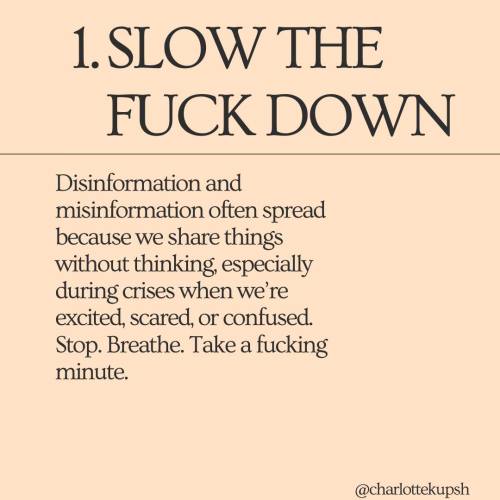
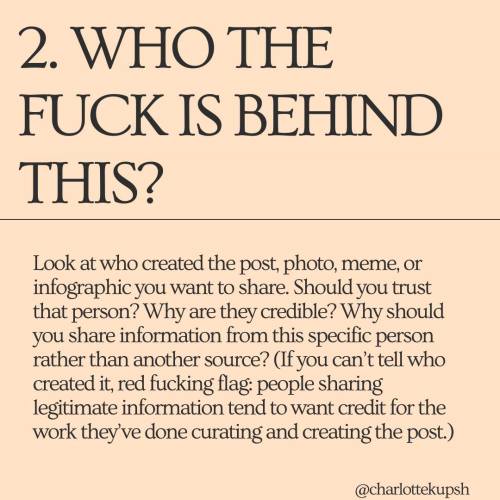

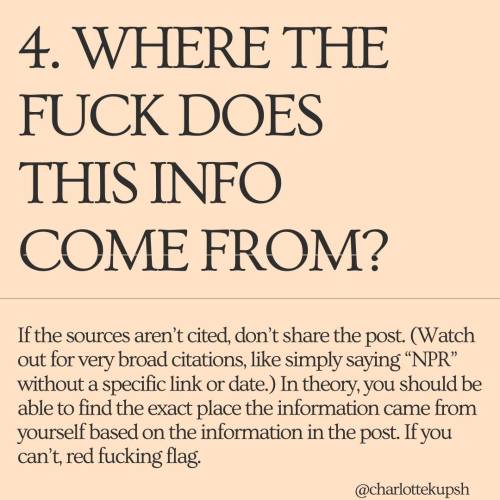



NOTE TO SELF-SLOW THE FUCK DOWN!
If any of y’all didn’t know, there’s a free online library, aka
https://openlibrary.org/
and I found like, twelve ebooks I’ve been wanting to read on there, and blasted through like three of them during the course of a boring-ass shift.
I really wish arknights didn't have a character who's named for an ethnic slur of my people
academic bias is so funny because you’ll be reading about the same historical event and one person is like “Despite the troubles that befell his homeland and near constant criticism of the court King Blorbo remained strong in the face of adversity” and the other one is like “after letting his people carry the brunt of his cringefail decisions Blorbo the Shitface refused to listen to any reason and continued to be a warmongering piece of shit. Also he was ugly.”


Nex was an LGBT2QIA Choctaw kid who was murdered in Oklahoma.
